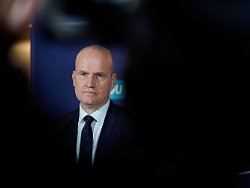The outgoing CDU leader Laschet congratulates the traffic light on the style and form of the negotiations, criticism comes from other officials of the Union. Above all, the migration policy will create “new pull effects”.
The Union is not in an enviable position. Not only because she lost the federal election and after 16 years in government has to get used to her unfamiliar role in the opposition. But also because she is in the middle of this difficult transition process looking for a new party leader.
A few days ago someone who is running for this office wished the traffic lights all the best. “I think they deserve a chance to do well and maybe even better than the coalition that is coming to an end,” said Friedrich Merz last Monday at a candidate presentation in the Konrad-Adenauer-Haus.
The reactions of Union politicians to the presentation of the traffic light coalition agreement on Thursday were not quite as friendly. The CDU / CSU parliamentary group wishes the new federal government “really everything, all the best,” said parliamentary group leader Ralph Brinkhaus. “But after the first review of this coalition agreement, we are of course concerned.” There is no sign of a new departure and no stringent handwriting. Something is promised to everyone, “and we do not see how that should be counter-financed”. The coalition agreement is weak in terms of both economic and climate policy. The SPD prevailed with high social spending. “In this respect, we are very excited to see how this coalition will look in the next few months.”
CDU General Secretary Paul Ziemiak said in a very similar way: “If you skim the contract now, it is so that many people have the impression that Christmas has been brought forward and now is the day when the presents are presented, but no one answers the question how that should be financed. “
“FDP falls far short of their claims”
The criticism of Brinkhaus and Ziemiak is understandable insofar as it is not the task of the opposition to praise the government, even if this government is only in the process of becoming. But there is another reason: The traffic light parties had staged the presentation of their coalition agreement as a counter-event to the previous federal government. Despite all the differences, the SPD, Greens and FDP had one thing in common, said FDP leader Christian Lindner: wanting to change the country. Lindner spoke of a “government in the middle” that wanted to lead the country forward. If the motto of the traffic light weren’t “Dare to make more progress”, it could also be “We don’t want everything differently, but we want to do a lot better than the Union”.
Ziemiak also accused the traffic light of not having founded a digital ministry. Group vice-president Nadine Schön said that the FDP in particular, “which for years has been calling for this task to be bundled in a digital ministry,” remains “far behind its own claims”.
The previous FDP General Secretary Volker Wissing will be responsible for digitization, albeit in a ministry for transport and digitization. The Federal Ministry for Transport and Digital Infrastructure, headed by CSU politician Andreas Scheuer, has had this layout up to now. In the election campaign, the FDP had called for a digitization ministry. The SPD and the Greens were rather skeptical about the issue. “I think we need above all a stronger coordination of digital policy and more space for interdisciplinary and cross-departmental digital-political projects,” said the digital policy spokesman for the SPD parliamentary group, Jens Zimmermann.
Criticism of the “left-yellow coalition”
CSU regional group leader Alexander Dobrindt said the coalition agreement was “the birth certificate of a left-yellow coalition”. With this catchphrase, which Brinkhaus also used, the CDU and CSU obviously want to deny the traffic light the claim to be a coalition of the “center”. With a view to migration policy, he said the coalition agreement contained “new incentives and new pull effects that will lead to significantly more migration to Europe and Germany”. Union parliamentary group vice-chairman Thorsten Frei also accused the traffic light parties of “taking a tough left-wing course” on the issue of migration. The migration policy part of the coalition agreement bears the signature of the Greens, according to the CDU politician.
In fact, the new coalition is striving for a “paradigm shift” in migration and integration policy, as stated in the coalition agreement. However, the traffic light also wants to “reduce irregular migration and enable regular migration”. Frei also accused the “left-yellow coalition” of putting “security in Germany to the test” with its domestic political plans.
The incumbent CDU chairman Armin Laschet did not comment publicly. On Twitter he wrote: “Congratulations to the Ampel-Coalition, especially on the style and form of the negotiations. Confidentiality is an important prerequisite for trust. The Union must learn that too.” Laschet sounds very wistful here, as he not only suffered during the election campaign, but even during the explorations with the Greens and the FDP from the numerous breaches from the Union. He brought a little criticism in his Tweet also under: “It’s a shame that the chance for the digitization ministry and the National Security Council was wasted.”
